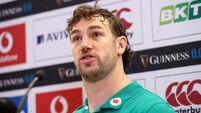IRB kowtow to British laptops on Horwill
He passed the ball to Israel Folau.
Although there was still half an hour left, James Horwill’s men were beginning to look vulnerable as the Lions mounted one of their rare attacks on the Wallaby tryline. Had O’Driscoll’s floater found George North rather than Folau, it may have been try time for the Lions and good night, God bless for the Wallabies. The home side was noticeably buoyed at getting out of their own territory and although they didn’t score for another 26 minutes, it was the energy-reviving boost required.















